by Jenny Rose | Nov 16, 2017 | Connection & Community, Emotional Intelligence, Shadows
I recently had a conversation in which I learned about the degree to which my anxiety affected at least one of my now adult children.
Parenting is an ironic business. Having been a chronically anxious child myself, always feeling unsafe and afraid, I strove mightily to protect my own children from any sort of fear or insecurity. Of course, I did this by assuring them all was well, all the while fearing all was not and never would be well. Being no less intelligent than I am, they heard the words but knew the truth of my feelings, and thus their trust in me was damaged, an exact replay of what happened between me and my own mother. You know, that thing I was never going to do when I was a parent!
Well, I’m humbled. I’m also sad, because I didn’t want either of my kids to battle with the burden of anxiety. It’s a hard way to live.
However, I understand parenting, at best, is an imperfect process, and I try to hold my mother and myself with gentle arms regarding our choices as mothers. Parenting less than perfectly does not imply a lack of love. I know we both did the best we could with what we had at any particular point in time. No parent can do more.

Photo by Liane Metzler on Unsplash
Still, this kind of revelation is a far cry from my hopes, dreams and intentions when I held my newborns. On the other hand, it speaks to the strength of my relationship with my adult children that they can tell me the truth about their experience and I can hear it.
After our conversation, I’ve thought a lot about fear and anxiety. I can’t go back and reparent, but I wonder if I might, even at this late stage, find a way to extricate myself from the insidious tentacles of anxiety. I’ve been thinking about my life and trying to understand exactly what the roots of my anxiety are.
According to an Internet search, fear is “an unpleasant emotion caused by the belief that someone or something is dangerous, likely to cause pain, or a threat.” Fear is considered real, in that it’s right there in front of us, and elicits an immediate response.
Anxiety is an “emotion characterized by an unpleasant state of turmoil; a feeling of worry, nervousness or unease, typically regarding an imminent event or something with uncertain outcome; a nervous disorder.” Anxiety is differentiated from fear by being more diffuse and generalized and focusing on imaginary outcomes and possibilities. Physiologically, it elicits the same response, and therein lies part of the problem.
Both are unpleasant emotions or feelings affecting us physically, intellectually and emotionally. We evolved to respond to fear in certain specific physiological ways, returning to baseline as the fear passes. Fear is a valuable feeling, helping us discern and avoid danger. I certainly don’t want to disable mine. I know the feeling of fear, but it’s not a frequent experience.
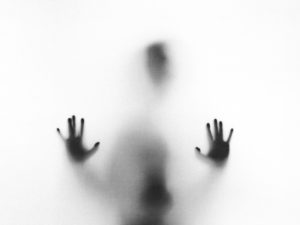
Photo by Stefano Pollio on Unsplash
Anxiety, on the other hand, is a chronic state for me. I can’t remember ever being free of it. I’ve developed a lot of coping mechanisms over the years, some more effective and appropriate than others, but I can’t imagine what life would be like without it. As far as I can tell, the feeling of anxiety provides no benefits whatsoever to me or anyone around me. It’s highly contagious and negatively impacts others in my life, to say nothing of the damage it does to me. We are not constructed to tolerate the chronic level of physiological arousal produced by anxiety.
I never before actually looked up these words, and I’ve never had the above distinctions between fear and anxiety until this week. I conclude that I have no problem with my relationship to fear, but I’m a slave to anxiety.
I find a kind of mordant humor in having a chronic unpleasant feeling regarding uncertain outcomes. Excuse me? All outcomes are uncertain for everyone until they happen! Most of us operate most of the time as though we know exactly what will happen next, but we don’t. I’ve lived long enough to know that’s all an illusion. Nobody knows what’s going to happen next on any level. For some reason, I’ve given that fact the power to make me miserable.
I have a powerful imagination, which makes me a good writer and creator. However, it also occasionally makes me captive to my own stories. I forget that my stories are just that — stories. I make them up, tell them to myself over and over, and behave as though they’re true, never really noticing when they diverge from reality. In my head, it’s all so real. I do know the difference between a story and what’s real, but I have to remind myself to keep the two separated.
Some stories are so old and deeply ingrained it takes a cataclysm to make us realize they’re not true, and then we have to deal with being wrong and all the consequences, an uncomfortable, humbling and messy process.
If my anxiety is rooted in uncertain and imaginary outcomes and possibilities, it seems obvious I can disable it with a little discipline, a dash of surrender to uncertainty, a lot of presence and the will to change. I’m chagrined by the possibility my anxiety is a lifelong bad habit as much as anything else. Could that be true? Yikes.
I wish with all my heart I’d been a better equipped and less distressed parent, but I remind myself I can’t go back. I can’t begin parenting again from ground zero. I can’t go back to the young woman I was and explain all this and give her the support and safety to actively choose to turn away from anxiety before starting a family. There’s only today, so many years later, as I sit with my laptop in my lap and the sun coming in the windows, glancing at my notes, thinking and writing.
I know all I’ve ever wanted for my own mother is health and happiness. I want the same for my kids. I suspect Mom and my sons also want that for me. Perhaps it’s time for me to shape an anxiety-free life now, not only for my own sake, but for those closest to me as well.
We build our lives on outcomes, one after another, more than we ever notice. We remember the spectacularly good and spectacularly bad outcomes, but what about the countless others? Outcomes are complex, not black and white. Outcomes can create visible and invisible ripples that last a lifetime. I can hardly think of a more fruitless endeavor than worrying about or trying to control outcomes. I’ve survived every outcome to date. What makes me think I won’t continue to do so — until I don’t, of course? But the outcome of death is largely out of my control, too. Why worry?
There are so many things I’d rather do than struggle with anxiety!
There are so many stories to imagine, share and write, rather than keep in my head and hurt myself with!
Anxiety is too expensive. I’m not interested in maintaining it anymore.
Better late than never. My daily crime.

Photo by Senjuti Kundu on Unsplash
All content on this site ©2017
Jennifer Rose
except where otherwise noted
by Jenny Rose | Sep 28, 2017 | Connection & Community, Emotional Intelligence
When I was pregnant with my first son in 1989, I approached parenthood the way I approach every new endeavor. I read whatever I could get my hands on. I had a shelf of books on pregnancy, labor and delivery, breastfeeding and parenting. Like most parents, I wanted to be the best I could possibly be.
Twenty-five years later that I came across the only book I needed, a simple paperback I’d never heard of or seen, a book never mentioned by health professionals, teachers or anyone else. The book was The Continuum Concept by Jean Liedloff. It only took me a couple of days to read, and I cried through the whole thing. I’ve rarely read a book that so completely captured my private longings and sense of being broken.
By then, of course, it was far too late to apply the information as a parent.
As I embark on the second half of my life, I think about the continuum concept every day. I grieve for us all, victims of rape culture, many of us broken and maimed sexually, physically, mentally and emotionally. Few of us have any idea what a healthy human relationship looks like, and fewer still know how to go about creating and participating in one, or are in fact able to because of the damage current parenting practices and other social norms cause.
My own needs for affectionate, nurturing touch and in-arms experience are chronically unmet and over the years I’ve learned to spend time in water, in the sun, with animals and in nature as substitutes for human contact.
The trees and forests here are nothing like the pine and aspen forests I knew growing up in Colorado. The broadleaf forests in Maine are tall and deep and thick, every layer incredibly rich and complex. The trees are a mix of fruit, evergreen and hardwood such as birch, beech, oak, ash and maple, to name but a few.
Over the months, as I’ve walked this place and made friends with it, I notice a thing about this forest.
The trees die in one another’s arms.

Orchard Field
Trees of all ages grow here. Older, damaged or weak trees begin to lean and die. They can remain standing in death, becoming snags for wildlife and insects, or rot from the inside out and the roots up with the help of fungi and moss. These can be pushed over with one hand, and as they fall they collapse wetly into pieces, releasing the woody smell of mushrooms. Smaller trees can sometimes find a way to fall all the way to the ground, especially at the edges of forested areas or along the river, but the huge old trees away from the edges have no room to fall entirely. They might drop branches or break at various points up the trunk, but the whole tree can’t come down at once.

Die in my arms 09/27/17
All over this 26 acres old trees are leaning, dying or dead, held in the arms of their healthy, living neighbors. Some neighbors of the same species are no doubt family members, but it doesn’t matter. A tall, strong ash might hold an old beech, or a maple support the skeleton of a pine.
This is not a dutiful, quick, can’t-wait-to-get-it-over-with embrace, but a years-long in-arms relationship while the dead tree rots and breaks down, feeding its patient supporter and the rest of the forest, until the moment comes when the last of its body decays enough to fully rest on the ground where it was born.
The forest grows together, lives together and dies together.

Die in my arms 09/27/17
Yesterday morning I went out to clear around an old shed we plan to put a foundation under and use. At one time there was an arbor along the south side of the building that supported a grapevine. The arbor is long gone now, and the sprawling grapevine is as thick as my wrist in some places and has spread over an area of about 50 square feet. I went to work, lopping saplings and woody growth and pruning the rest. The vine had produced some purple grapes as it crawled up the shed wall. I’ve never tasted a grape with such intense flavor, but there weren’t many. I wondered if we built a temporary trellis and I gave it some attention we might be able to take cuttings and save it. If it can survive years of neglect and still fruit, it seems to me it’s happy here.

Apple and grapevine 09/27/17
I worked away until I came to the foot of an old apple. This tree is gnarled and twisted, as they often are, and the entire trunk is hollow from below eye level to my highest reach with several entrances and exits. This particular apple is early, and the fruit has mostly dropped and been eaten by wildlife. As I knelt under the tree, cutting back woody undergrowth, I looked up.
The grapevine, having no trellis to climb on, had over the years climbed the tree instead, and pounds and pounds of purple grapes hung down from the apple tree canopy, invisible unless you stand right under the tree.
Die in my arms, I thought, looking up in wonder. Live in my arms. Flourish, shelter and fruit in my arms.

Photo by Edu Lauton on Unsplash
Trees are not people. Clearly, people are not trees. We have demonized the continuum concept. We have civilized ourselves into cities of concrete and steel, hospitals, institutions and prisons. Touch in our culture is about rape, violence, abuse, capitalism and control. The need and desire to give and receive touch is viewed as inappropriate and dangerous. We’re addicts, homeless, outcast, broken, sick and lonely. We’re divided from one another, competitors and enemies. Few of us will die in anyone’s arms.
No, people are most certainly not trees.
All content on this site ©2017
Jennifer Rose
except where otherwise noted
by Jenny Rose | Oct 13, 2016 | Connection & Community, Emotional Intelligence
This week I’m turning my attention to reciprocity. Again, this subject is much bigger than one post, so I’m breaking it into smaller pieces, just as I did with boundaries. For me, reciprocity describes a specific aspect of a larger subject: Balance.
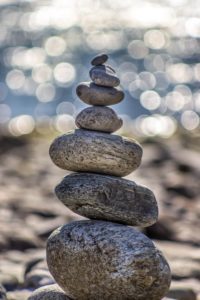
Photo by Deniz Altindas on Unsplash
Balance is, according to a quick internet search, “a condition in which different elements are equal or in the correct proportions.” I’m constantly running into articles, blogs, books, opinions and speakers who talk about balance. It’s an important concept these days: Balancing family and jobs, balancing creative life with paying-the-bills-life, balancing technology with face-to-face connection, balancing our diet (and our bathroom scales), balancing our exercise, balancing our time and our checkbooks. With so much discussion out there, I wonder why many of us are so remarkably bad at it.
I think finding balance requires two things. The first is clarity — the willingness to look honestly at our lives and our choices. The second is taking responsibility for the fact that we do make choices.
I don’t know a soul who finds either one of these easy, and I also don’t know anyone who always feels great about the balance in their lives, in spite of what they may say.
Note in the definition above the language “correct proportions.” What are the correct proportions? You tell me. Are you happy? Are you healthy? Do you find your life meaningful? Do you enjoy your home, your relationships, your work, a good night’s sleep? If the answer is no, and you want things to be different, I suggest you work with the idea of balance.
It so happens I came across a great exercise for this years ago in a book called Home Sanctuary by Nicole Marcelis. I was just out of an abusive marriage and this book became an important part of reclaiming myself, my life and my home. In it, there’s a chapter on balance.
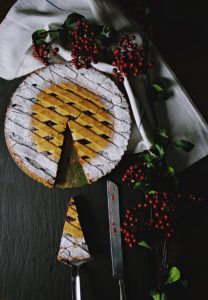
Photo by Toa Heftiba on Unsplash
The exercise asks you to make a pie chart and consider each piece of your life, calculating how much of the pie that piece takes up. Yes, you include sleep. You can make a pie chart for a day, a week, a month, or any increment of time you choose. Then, if you like, you can take each piece of that first pie chart and make another pie chart. If one of your pieces is parenting, for example, you might break parenting down into playtime, laundry time, cooking and food time, taking walks, reading aloud, visiting doctors, etc.
This exercise has absolutely no value (except to let you play with big pieces of paper and crayons) if you’re not willing to do it honestly. I, for example, am a solitaire junkie. I can play solitaire on this laptop for hours. Literally. Whenever I’m upset, or bored, or trying to regulate my feelings, I play solitaire. I feel like it soothes my anxiety when all the cards fall into neat little piles. I tell myself (and others) I’m planning what to write, or making a grocery list or writing an email, but that’s just bullshit. I’m playing solitaire and I’m feeling numb.
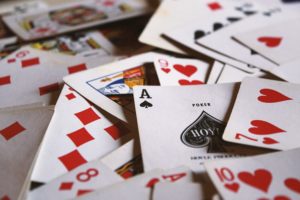
Photo by Jack Hamilton on Unsplash
A game or two of solitaire is not a problem. I don’t feel ashamed. An hour or two is getting out of control. Three or four hours and I’m hiding it from my family. I do feel ashamed. I have a partner, a blog, a job, and I’m writing a book. I live in a beautiful place and love to be outdoors. What’s up with sitting for hours playing solitaire? Something is wrong. I’m out of balance.
Don’t be a weasel with this. Watching TV with your mate does not count as quality relationship time. Watching TV with your kids is not great parenting time. Don’t lie to yourself about your relationships. Connection time has to be connecting for everyone involved. Family mealtime is nothing but a sham if someone spends it on their tech device or you’re glued to the TV. (No, news isn’t different than a sitcom!) That goes in your tech or TV slice of the pie. You have to come clean with yourself in order to make real changes.

Photo by Frank Okay on Unsplash
The thing about balance is it’s dynamic. What’s balance for this day won’t be the same for another day. As we stand upright we’re using countless muscles, nerves and our senses to maintain our balance and proprioception. Balance in our lives is the same way. It’s so easy to get off balance, but the good news is one can regain it nearly as quickly.
But only if you’re willing to be honest and claim your power to make choices.
This exercise is fascinating. What I realized was I didn’t really know what I was doing with my time. When you actually count the hours you spend doing whatever you’re doing, it can be a real eye opener. When you’re finished playing with paper and crayons and you look at your life through the lens of these pie charts, then it’s time for some hard questions. Does the way you choose to spend your time reflect your priorities? If you say your family is your priority and 80% of your pie chart is spent working (yes, commuting counts!), then you’re out of balance and you’re also not being honest. If you love the outdoors and want to be exercising more but you don’t because you’re couch locked in front of the TV, you’re out of balance. (Watching Planet Earth doesn’t count.)
The exercise is entirely flexible. It works with any resource, not just time. For example, you can do it with energy. Is there a connection or relationship in your life that demands all your energy? Are you getting as much as you’re giving? Are there other relationships that nurture and reward you that you’d rather be spending time in, but you can’t because you’ve got this vampire attached to your jugular vein?
How about money? Most of us have budgeted at one time or another. Tell me, friend, how much money do you spend on cigarettes? On drugs? On beer? On shoes? Cable TV? Can you buy food? Are your bills paid? Are you working at a job you hate because you need the money in order to support your habits — and are those habits making you happy and healthy?
We all have the same 24 hours in any given day, and we all choose what to do with those hours. This is not so much about making “right” or “wrong” choices as it is about realizing we are making choices. Nobody makes us watch four hours of TV every evening. If we’re longing to do creative work and we tell ourselves and the world we haven’t time for it, all we’re really saying is we lack the will to make it so. Why not be honest and say we’re too afraid to try, or we’ve given our power to someone else, and they say we can’t, or we’re an addict and our addiction has our power?
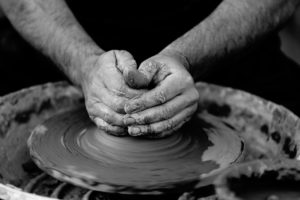
Photo by Quino Al on Unsplash
If you made a pie chart of the kind of life you want to have, with the perfect balance for your needs, how different would it be from what your life is now? What needs to happen to make changes? What can you excise from your present chart in order to free up time/energy/money/life?
Make no mistake, this exercise takes an enormous amount of courage, but the payoff is powerful. I revisit it now and then, just because I like to keep track of what I’m up to, and I want to know my choices are reflecting my priorities. I also note I’ve told people about this exercise, two of whom seemed to have no life outside of work and unhappy partners, and one who spent hours of screen time every day, both TV and computer, but talked about doing all kinds of fun things in the real world. I even loaned my book to one of them. None of them had time for clarity, change or choices.
Silly me.
Solitaire, anyone?
(This is the first post in a series of 4. See also Parts 2, 3, and 4.)
All content on this site ©2016
Jennifer Rose
except where otherwise noted
by Jenny Rose | Jul 28, 2016 | Emotional Intelligence
A year and a half ago I left everything I knew and traveled halfway across the continent in a U-Haul to start a new life in Maine. I’d never even bought a plane ticket for myself before. I’d never taken a road trip. I’d never lived anywhere but Colorado. I’d never been to Maine. I rented my little house, which I’d never intended to leave, and I’d never been a landlady before. I had very little money, and in fact had to borrow money to accomplish the transition (which I’ve since paid back).
I was 51 years old.
As you can probably imagine, this decision was not met with enthusiastic support from all sides.
How this impacted my relationships will be a subject for future posts. Today I want to answer the question no one quite asked, but everyone wanted to:
WTF?

Photo by SHTTEFAN on Unsplash
It’s complicated, of course. It always is. The short version is that I slowly realized I was living a life that didn’t feel like my own. Nothing fit right. It was as though I’d been wearing clothes and shoes from someone else’s closet. My life was a tiny room that got a centimeter smaller every day. I lost a relationship, the neighborhood diner and my dearest companion. I woke every morning knowing I would fail, no matter how hard I worked at…everything. I felt like a character in a play someone else had written and I began to drop my lines.
The most remarkable thing about that time wasn’t that I was having an unusual experience. I’m certain many of you reading this can relate to my experience. No, what’s remarkable is that few people knew how it really was with me, which was exactly how I wanted it.

Photo by Hailey Kean on Unsplash
I had a beautiful little house that everyone loved. I had friends. I had a garden. I lived in a lovely place that had been home for nearly twenty years. I was financially independent — as long as nothing unexpected happened. I had my music, my movies, my books, my early morning walks, my comfortable bed, my dance group, my small luxuries. I had a good life, and I wasn’t happy. I was deeply ashamed. I was also unbelievably, unbearably, terminally lonely.
I began to write more, not with any plan or hope, but because I had to. Because it was the only thing I really enjoyed. It was the only time I felt real. For various reasons I felt unable to seek support for my writing locally, so I went online and connected with other writers. One of the writers I connected with was a life coach who teaches emotional intelligence.
I decided to work with him, and that’s when it all began to change.
I’m not going to try to sell you on life coaching. You’re online right now — research for yourself. There are lots of articles and sites to look at. I’ll let the coaches sell themselves. What I want to do is give you reasons not to do it, because if you hire a well-trained, certified, experienced coach and you’re serious about the work your life is going to transform, and an exhausting, bloody, terrifying experience it is. Creating new life is damned hard work. Ask any mother.
So here we go. Don’t do life coaching if:
- You don’t want things to change, both internally and externally (good luck with not wanting things to change, by the way!).
- You’re not really willing to invest time and money in yourself.
- You’re looking for a therapist or prescription medications, or you’re struggling with serious mental illness.
- You don’t want to take responsibility for your power, life and choices.
- You don’t want to deal with your feelings.
- You’re perfectly happy with your current role of victim, martyr, addict, people pleaser, passive aggressive, etc. (But in that case you might recommend life coaching to someone you’re in relationship with. Perhaps they could use it!)
- You don’t want your creative life to blossom.
- You don’t want to be honest.
- You don’t want to learn new language, strategies, coping mechanisms and communication skills.
- You don’t want your relationships at work, in your family and with your friends to become healthier, more honest and more effective.
- You don’t want to become a more effective and loving parent.
- You don’t want to cut out of your life the habits, relationships, behaviors and beliefs that are holding you back.
And so how, you ask, has it worked out so far? The coaching, the move, the new life?
Guess what? It’s not perfect. I miss parts of my old life. But I live with meaning, learning, creativity, humor, curiosity, joy, love and companionship. I recognize myself. I like myself. I feel useful and successful. I’m learning to be more honest.
The coaching, the move, the new life?
Best thing I ever did.

Photo by Annie Spratt on Unsplash
All content on this site ©2016
Jennifer Rose
except where otherwise noted















